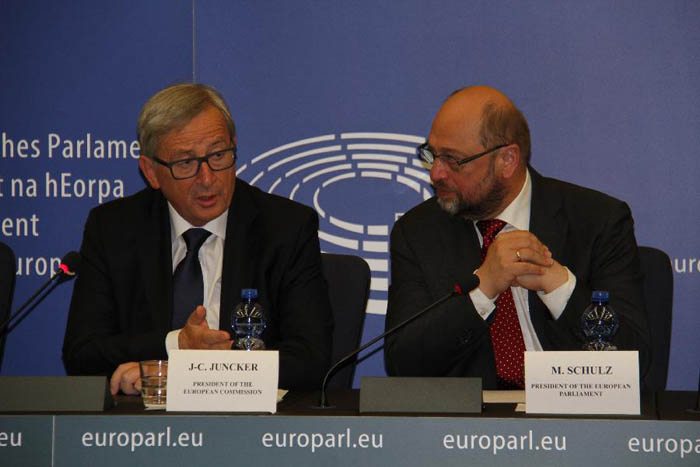Euro Parliament adopts urgent migration measures, urges states to act

"We have a humanitarian crisis and we need to act on it now. Relocating 40,000 refugees is just the start. Let the measures be the start of a rights-based, a fair and a common asylum policy, in solidarity with all the member states and in solidarity with the refugees," declared German Rapporteur Ska Keller (Group of the Greens - European Free Alliance).
The legislative resolution on the plan for an emergency relocation of an initial number of 40,000 asylum seekers was adopted with 498 votes in favor, 158 against, and 37 abstentions.
During his address, Jean-Claude Juncker had detailed the new propositions for dealing with the migrations, starting with the relocation of 120,000 asylum seekers already in the EU, in addition to the proposition made in May to relocate 40,000. The Parliament, the only European institution directly elected by the citizens which is charged to supervise the work of the Commission and to render it accountable to citizens, must be consulted before these measures can enter into force.
The Commission president also presented a permanent relocation scheme for the future, a verified list of origin countries in order to assure more rapid returns of those for whom the asylum request is denied, and new channels for legal migration to the EU.
The permanent plan for emergency relocation must be based on "a more substantial contribution to solidarity and responsibility-sharing among member states, including a significant increase in the number of available relocation places," underlined the MEPs.
EP President Martin Schulz expressed congratulations during a press conference, "that beyond political colors, President Juncker could count on the veritable support" at the heart of the Parliament. "Now it is up to the national governments to bring their support as well as their contributions so that we can find long term solutions," he added.
Despite the consensus that emerged during the debates, certain voices of opposition were nevertheless made heard at the extreme right of the political spectrum.
"We want a European policy on asylum which opens the way to a true migratory policy in the European Union," declared the President of the Progressive Alliance of Socialists and Democrats group Gianni Pittella.
Certain arguments echoed those of Syed Kamall for the European Conservatives and Reformists Group, however: "All the European countries (and other Western nations) must clearly play a role in order to help resolve the migration crisis, but a unique and mandatory system of relocation risks intensifying the finger-pointing which has characterized the crisis in recent weeks."
Guy Verhofstadt (Alliance of Democrats and Liberals for Europe) had, according to him, exhorted "President Tusk to present his propositions so that the heads of state work together to find a solution to this humanitarian disaster."
Among the ranks of the ecologists, MEPs displayed their support for migrants without ambiguity: "We are waiting for the representatives of the elites in power to give a clear place for refugees in all urgency," stressed Gabi Zimmer (Confederal Group of the European United Left - Nordic Green Left) while Philippe Lamberts (Group of the Greens - European Free Alliance) declared: "The quarrels at the interior of Europe and the lack of solidarity have only exacerbated the humanitarian crisis, for which we share responsibility."
The discourse was entirely different within the ranks of the Front National (French extreme right). Its President, Marine Le Pen, accused European leaders, the United Nations, the "promoters and defenders of the Schengen agreement," the Turkish government, Qatar and also "the French political leaders who pervert asylum laws and lie to the French people in claiming that we can decently accept this economic immigration even while France counts 7 million unemployed and 10 million people in poverty."
Concerning the wall that Hungary is constructing in order to prevent migrants from entering its territory, President Juncker had elsewhere declared during a press conference: "I believe that the method used by Hungary is not the right one. We don`t need an iron curtain, but rather an iron will."















































